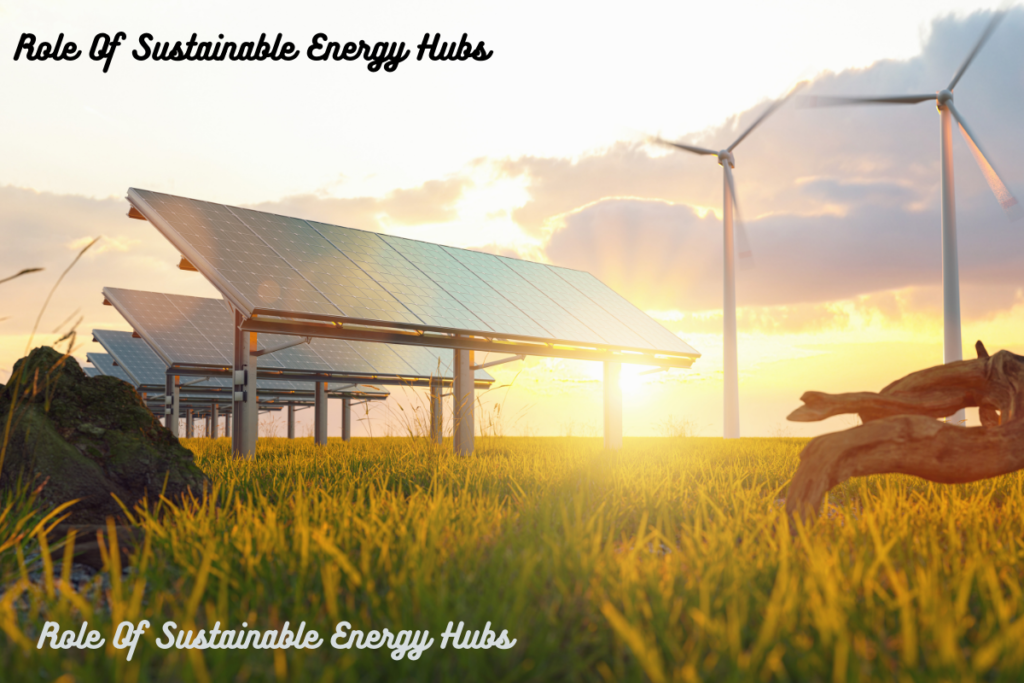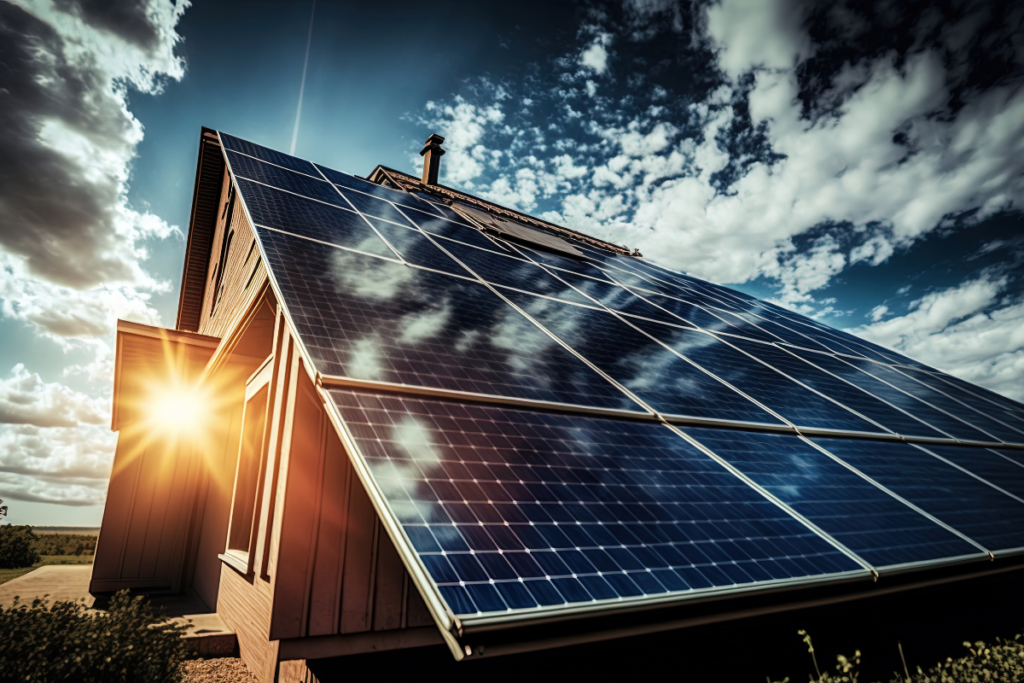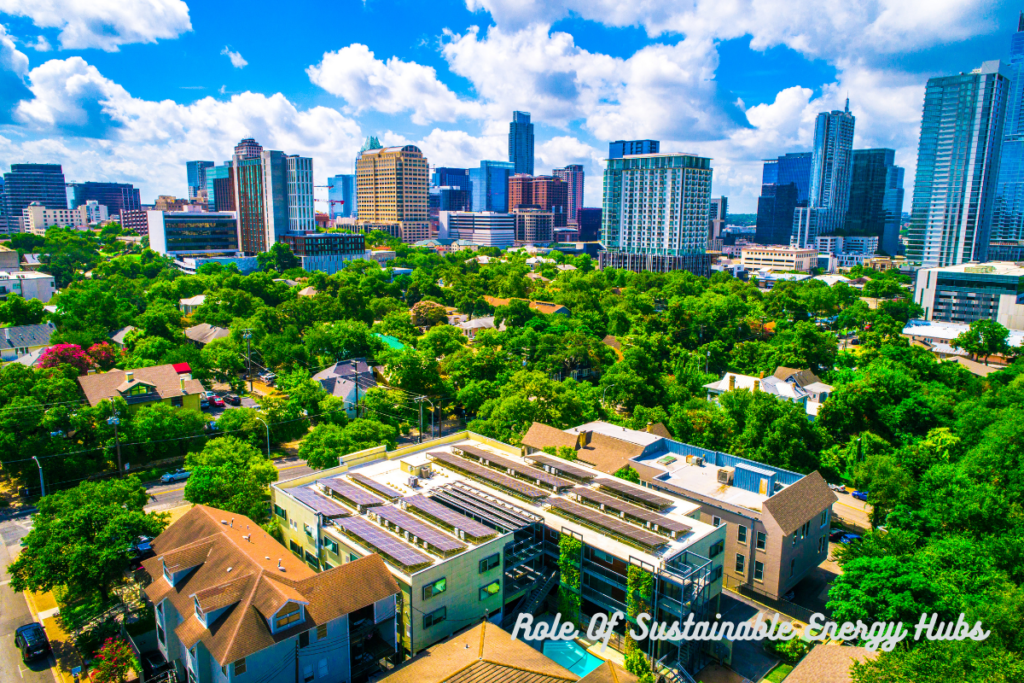Introduction to the topic "The Role of Sustainable Energy Hubs in Shaping a Greener Future":

“Sustainable energy hubs are emerging as pivotal players in the transition to a more environmentally friendly and sustainable energy landscape. These hubs serve as centralized points for integrating various renewable energy sources, storage systems, and smart grid technologies to deliver clean and reliable energy services. In this context, understanding the role of sustainable energy hubs is crucial in paving the way for a greener future characterized by reduced carbon emissions, enhanced energy efficiency, and increased resilience in energy systems.”
This topic discusses how sustainable energy hubs can improve environmental outcomes and create a more sustainable energy ecosystem by promoting renewable energy adoption, energy independence, and community sustainability.
Table of Contents
Role of Sustainable Energy Hubs in Integrating Solar, Wind, and Hydroelectric Power:
Solar, wind, and hydropower electricity are coordinated and combined at sustainable energy hubs. These centers are carefully placed to maximize energy production efficiency and minimize environmental effect by using each energy source’s capabilities in a region. Sustainable energy hubs streamline energy generation, storage, and delivery by incorporating renewable energy technology.
These hubs connect renewable energy systems, creating a more balanced and reliable energy supply. The Role of Sustainable energy hubs ensure stable energy output from renewable sources like solar and wind through smart management and creative technological integration. This method fosters a cleaner energy mix and improves energy system sustainability and resilience.
Overall, role of sustainable energy hubs help harness the power of solar, wind, hydropower, and other renewable energy sources to create a more sustainable and eco-friendly energy paradigm.
Maximizing Energy Distribution Efficiency through Advanced Technologies in Sustainable Energy Hubs:
Innovative technologies like energy storage systems and smart grids help sustainable energy hubs streamline clean energy distribution. These hubs efficiently and sustainably handle renewable energy from production sources to end-users.
Energy storage devices in sustainable energy hubs absorb and store excess renewable energy during peak production. This stored energy can be used during times of high demand or when renewable energy sources aren’t making power. This keeps the energy supply steady. Energy storage devices stabilize the hub’s grid, eliminate energy waste, and boost energy efficiency.
Smart grid technologies let sustainable energy hubs keep an eye on, manage, and distribute energy sources based on real-time data and demand. Smart grids optimize renewable resource use, load balancing, and system resilience through dynamic energy management. This intelligent infrastructure reduces energy losses and improves grid response, improving energy reliability, cost-effectiveness, and sustainability.
Sustainable energy hubs use energy storage technologies and smart networks to improve clean energy distribution, grid stability, and the transition to a sustainable energy future.
Advancing Decentralized Clean Energy Solutions, the Role of Sustainable Energy Hubs in Emissions Reduction:

Sustainable energy hubs promote decentralized energy production and consumption models, which reduce fossil fuel use and greenhouse gas emissions. These hubs promote cleaner, more sustainable energy practices by decentralizing energy generation and supporting local energy self-sufficiency.
The Role of Sustainable energy hubs encourage decentralized energy production to engage communities and individuals in renewable energy development. This method promotes rooftop solar panels, small wind turbines, and micro-hydro systems, allowing local citizens to contribute to energy supply. Sustainable energy hubs reduce carbon emissions and environmental effect by diversifying energy sources and encouraging localized generation.
Decentralized energy consumption enabled by sustainable energy hubs improves local energy efficiency and resource optimization. Through energy management technologies and demand-side response tactics, these hubs help people and companies make informed energy consumption decisions, reducing waste and increasing conservation. This decentralized strategy promotes energy efficiency, emission reductions, and community engagement in a sustainable energy ecosystem.
The Role of Sustainable energy hubs promote decentralized energy production and consumption, which reduces fossil fuel use, greenhouse gas emissions, and creating a more sustainable energy landscape.
Enhancing Energy Resilience and Stability through Sustainable Energy Hubs:
Sustainable energy hubs improve energy resilience by stabilizing and maintaining energy supply, especially during disruptions or peak demand. These hubs establish a resilient energy infrastructure that provides communities and key services with reliable energy.
Diversified energy sources help sustainable energy hubs build resilience. These hubs integrate solar, wind, and energy storage systems to diversify the energy supply and lessen its vulnerability to supply chain breakdowns and fuel price volatility. This diversification lets sustainable energy hubs keep producing electricity when one source is limited.
The Role of Sustainable energy hubs also use advanced monitoring and control systems to improve energy distribution and respond to demand changes and unexpected events. These hubs use smart technologies and grid management solutions to dynamically change energy flow, reroute electricity, and prioritize vital loads during peak demand or emergencies, assuring a steady and resilient supply.
Sustainable energy hubs reduce downtime and ensure energy access for communities, key infrastructure, and essential services by prioritizing energy resilience. By reducing power outages and improving energy system stability, resilience improves energy security and economic and social well-being.
Sustainable energy hubs strengthen energy infrastructure against disruptions and meet community energy needs by diversifying energy sources, implementing smart grid solutions, and ensuring stable energy supply.
Driving Local Economic Growth and Community Engagement through Sustainable Energy Hub Development:
The creation and growth of sustainable energy hubs boost local economic development, employment, and community engagement in sustainable energy efforts. These hubs foster innovation, collaboration, and economic diversification, benefiting the environment and local people.
Sustainable energy hubs boost local economies through infrastructure investment and development. Sustainable energy infrastructure including solar arrays, wind farms, energy storage facilities, and smart grid systems demand trained personnel and resources, creating jobs and economic activity in the region. Sustainable energy centers also encourage economic growth and innovation by attracting clean energy investment, research, and development.
Sustainable energy centers create engineering, construction, operations, maintenance, and technology jobs. These centers need skilled workers to design, build, run, and maintain sustainable energy systems, creating jobs for technicians, project managers, data analysts, and energy specialists. This job creation enhances local employment and develops a green energy workforce.
By including citizens, companies, and organizations in sustainable energy projects, sustainable energy hubs empower local communities. These hubs encourage renewable energy, energy efficiency, and community participation in energy planning and development through educational outreach, community collaborations, and joint projects. Community involvement in sustainable energy initiatives builds pride, ownership, and sustainability awareness, improving social fabric and environmental stewardship.
Sustainable energy hubs boost economic growth, job creation, and community empowerment by promoting local development, innovation, and sustainability in the green energy transition.
Collaboration between stakeholders including energy providers, policymakers, businesses, and communities is essential for the successful implementation and scaling of sustainable energy hubs:
Renewal energy hubs must be implemented and scaled by energy providers, politicians, enterprises, and communities working together. These collaborative relationships assure objective alignment, resource allocation, and strategy implementation to drive hub-level sustainable energy adoption and expansion.
The Role of Sustainable energy hubs need energy providers’ technical competence, resources, and operational insights. Their involvement in hub energy infrastructure planning, design, and operation enables renewable energy integration, grid optimization, and stable energy supply. Energy suppliers use their domain expertise to deliver clean energy technology and solutions to suit the hub’s and stakeholders’ energy needs.
Sustainable energy hubs depend on supportive policies, incentives, and frameworks from policymakers and regulators. Collaboration with legislators ensures that legislative and regulatory procedures are in place to promote sustainable energy projects, ease permitting, and encourage green technology investments. Policymakers and sustainable energy hubs must align to overcome regulatory hurdles, secure finance, and advance sustainable energy policy.
The Role of Sustainable energy centers benefit from business knowledge, innovation, and investment. Business collaboration helps identify market trends, technical advances, and finance sources to scale sustainable energy solutions in the hub. Business participation promotes R&D collaborations, clean energy product commercialization, and new market prospects that boost economic growth and sustainability.
Communities provide local knowledge, support, and engagement in energy decision-making, making sustainable energy hubs successful. Sustainable energy projects are designed and implemented with community input to account for local needs, preferences, and priorities. Community involvement promotes inclusivity, openness, and shared ownership of energy programs, which creates trust, societal acceptance, and hub resilience and sustainability.
For holistic creation, successful implementation, and widespread scaling of sustainable energy hubs, energy providers, governments, entrepreneurs, and communities must collaborate. Work together, stakeholders may use their unique perspectives, knowledge, and resources to solve difficult energy problems, innovate, and establish a sustainable energy environment.
Sustainable energy hubs contribute to achieving sustainability goals, improving energy access, and bolstering environmental conservation efforts on a broader scale:

The Role of Sustainable energy hubs help achieve sustainability goals, improve energy access, and promote environmental conservation. Renewable energy, efficient energy systems, and community engagement help these hubs achieve sustainability goals and benefit the environment and society.
Sustainable energy hubs promote clean, renewable energy to achieve sustainability goals. These hubs help reduce greenhouse gas emissions and climate change by using solar, wind, hydropower, and other renewable energy sources. Global sustainability goals including carbon reduction and sustainable energy consumption are supported by sustainable energy hubs’ clean energy solutions.
The Role of Sustainable energy hubs improve energy access, especially in remote or disadvantaged areas. These centers improve energy security, reliability, and affordability for households, businesses, and institutions by deploying decentralized energy solutions and extending energy infrastructure. Improved energy access boosts social development, economic growth, and quality of life, helping accomplish sustainable development targets for energy access and poverty reduction.
Sustainable energy hubs reduce ecosystem effect, resource use, and land utilization to conserve the environment. These hubs maintain biodiversity, natural resources, and ecological footprint through energy planning, habitat restoration, and land stewardship. Sustainable energy hubs promote conservation and sustainable development by incorporating environmental factors into energy decisions.
The Role of Sustainable energy hubs promote sustainability, energy access, and environmental conservation. These centers promote renewable energy, energy access, and environmental sustainability to create a more sustainable and resilient energy landscape for society and the earth.
Conclusion:
Sustainable energy hubs are innovative and strategic solutions that are essential to a greener future. These hubs promote environmental sustainability, energy resilience, and community engagement by integrating diverse renewable energy sources, optimizing energy distribution with advanced technologies, and promoting decentralized production and consumption models.
Energy providers, politicians, entrepreneurs, and communities must collaborate to build and scale sustainable energy centers. This multidimensional collaboration is necessary for sustainable energy hub implementation, growth, and alignment with sustainability goals and strategies.
Sustainable energy centers help achieve sustainability goals, improve energy access, and boost environmental conservation. These hubs drive positive change toward a more sustainable energy ecosystem for present and future generations by promoting clean energy adoption, energy access, and environmental stewardship.
The widespread adoption and replication of sustainable energy hub models may revolutionize energy landscapes, empower communities, generate economic growth, and protect the environment, helping build a more resilient, inclusive, and sustainable socie
People also ask:
By lowering greenhouse gas emissions, decreasing pollution of the air and water, preserving natural resources, and lessening the consequences of climate change by utilizing renewable energy sources, sustainable energy benefits the environment.
Green energy will transform our future by fostering a cleaner, healthier planet, creating new employment, mitigating climate change, reducing dependence on fossil fuels, and promoting sustainability.